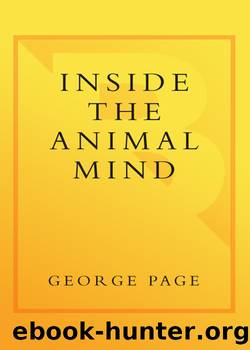Inside the Animal Mind by George Page

Author:George Page
Language: eng
Format: epub
ISBN: 9780767909310
Publisher: Crown
Published: 2001-08-02T00:00:00+00:00
8
The
(Alleged)
Great
Divide
TWO VIEWS
Is there any continuity between animal communication and human language, or are we confronted with an unbridgeable divide? Thinkers throughout the ages have been . . . well, divided. Aristotle found grounds for believing that there is a great deal of continuity up and down The Great Chain of Being. I cite this passage from Historia Animalium:
in a number of animals we observe gentleness or fierceness, mildness or cross temper, courage or timidity, fear or confidence, high spirit or low cunning, and, with regard to intelligence, something akin to sagacity. Some of these qualities in man . . . differ only quantitatively. . . . For instance, just as in man we find knowledge, wisdom, and sagacity, so in certain animals there exists some other natural potentiality akin to these.
But Aristotle drew the line at language and so arrived at his belief that we are the only rational animals. Descartes also drew the line at language. Darwin disagreed and saw continuity, of course, writing in The Descent of Man, âThe difference in mind between man and the higher animals, great as it is, certainly is one of degree and not of kind.â And supporting continuity, Jean Piaget argued that language is a âparticular aspect of the general capacity for representation.â Drawing is another aspect of representation; gesturing is yet another.
Certainly all species with anything like a nervous system operate pretty much the same at the cellular level. The differences between species are those of organizationâand even organization is quite similar in closely related speciesâand sheer size of the brain. And yet, as Darwin observes, the difference between animal communication and ours is so great. Without any question, language is the defining aspect of our human identity, of who we are, what we think, and what we do. Many of us probably think of the chimpanzee in rough-and-ready terms as having a humanlike mind, âminus the spoken language.â But this qualifying phrase may be crucial. Can we really imagine consciousness without language? It is difficult, but is it impossible? How do animals without language do anything that we would consider âthinkingâ? We just donât know. Many of us believe they do think, but itâs impossible to picture the experience precisely, because by this point in our own natural history, everything we think of as part of consciousness has become embedded in language.
Is it possible that within evolutionary continuity âsomething happenedâ that pushed us humans across some kind of awesome threshold? Do we humans have so much excess capacity in the frontal lobe that the difference in degree becomes a difference in kind? The stakes are high. As Donald Griffin points out, the only conceivable excuse we could have for denying consciousness to the great apes and the cetaceans is on the basis of language. This âWe have it, they donâtâ declaration is precisely the position of Noam Chomsky most famously, but also of many other linguists and philosophers who argue that human language is sui generis, the product of a uniquely human âlanguage organ.
Download
This site does not store any files on its server. We only index and link to content provided by other sites. Please contact the content providers to delete copyright contents if any and email us, we'll remove relevant links or contents immediately.
Kathy Andrews Collection by Kathy Andrews(11830)
The remains of the day by Kazuo Ishiguro(8997)
Spare by Prince Harry The Duke of Sussex(5194)
Paper Towns by Green John(5188)
The Body: A Guide for Occupants by Bill Bryson(5095)
Industrial Automation from Scratch: A hands-on guide to using sensors, actuators, PLCs, HMIs, and SCADA to automate industrial processes by Olushola Akande(5061)
Machine Learning at Scale with H2O by Gregory Keys | David Whiting(4312)
Be in a Treehouse by Pete Nelson(4051)
Never by Ken Follett(3953)
Harry Potter and the Goblet Of Fire by J.K. Rowling(3856)
Goodbye Paradise(3809)
The Remains of the Day by Kazuo Ishiguro(3408)
Into Thin Air by Jon Krakauer(3398)
Fairy Tale by Stephen King(3391)
The Cellar by Natasha Preston(3342)
The Genius of Japanese Carpentry by Azby Brown(3308)
120 Days of Sodom by Marquis de Sade(3273)
Reminders of Him: A Novel by Colleen Hoover(3115)
Drawing Shortcuts: Developing Quick Drawing Skills Using Today's Technology by Leggitt Jim(3080)
